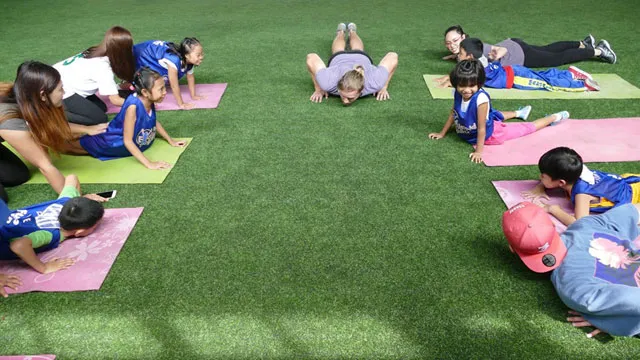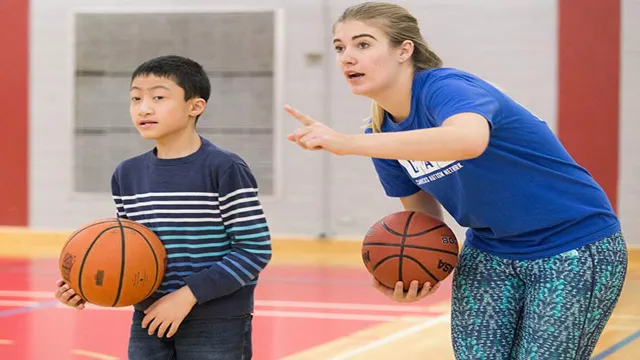If you’re a parent or caregiver of a child with Autism Spectrum Disorder (ASD), you may be wondering how to encourage physical activity and sports participation in your child. Sports can provide a range of benefits for kids, including improved socialization, gross motor skills, and overall physical health. However, children with ASD may face unique challenges when it comes to getting involved in sports and physical activities.
Here’s the good news: there are many sports and adapted programs designed specifically for kids with ASD, making it easier than ever to find a fun and engaging activity for your child. In this blog, we’ll explore some of the best sports for kids with Autism and tips for getting started.
Benefits of Sports for Kids with Autism
Sports for kids with autism can be highly beneficial in many ways. Firstly, sports can be a great way to help children with autism improve their communication skills, as they need to communicate effectively with team members and coaches in order to play the game successfully. Additionally, sports can help to teach social skills and encourage teamwork, which are both critical skills that kids with autism often struggle with.
Moreover, participating in sports can provide a sense of routine and structure, which can be particularly helpful for kids with autism who may have difficulty with transitions or changes to their environment. Finally, sports can also help to improve physical coordination and promote overall health and well-being, which is important for any child. Overall, sports can be a great way for kids with autism to develop new skills, build relationships, and stay active and healthy.
Improved social skills
Participation in sports activities can have a positive impact on children with autism, especially in improving their social skills. When kids with autism play sports, they learn valuable social interaction skills and have the opportunity to interact and communicate with other children. This helps in increasing their confidence, and understanding of social cues such as eye contact, facial expressions, gestures, and body language.
It also provides a social platform for them to develop their interpersonal skills such as communication, teamwork, and cooperation. Moreover, sports offer a structured environment that helps them in regulating their emotions, thus, reducing anxiety and stress. Kids with autism can reap the benefits of sports in various ways such as improved coordination, better physical fitness, and enhanced self-esteem.
All in all, sports provide an excellent opportunity for kids with autism to learn and develop new skills, build relationships, and have fun.

Enhanced physical fitness
One of the many benefits of sports for kids on the autism spectrum is the enhancement of physical fitness. Playing sports provides a great form of exercise, helping to improve children’s physical health. It encourages them to be more active and engage in activities that they may not typically enjoy doing on their own.
Not only does it help to increase their cardiovascular endurance, but it can also improve their strength, coordination, and balance as well. Furthermore, engaging in sports gives children the opportunity to develop their motor skills and hand-eye coordination, which can be challenging for those on the autism spectrum. By participating in team sports, they also learn valuable social skills, such as teamwork and communication, creating an environment that can foster friendships and increase self-esteem.
Overall, sports can be an excellent outlet for children with autism, improving their overall health and well-being in multiple ways.
Reduced screen time
Reduced screen time One of the many benefits of sports for kids with autism is reduced screen time. As modern life becomes increasingly centered around screens, it’s more important than ever to encourage children to engage in physical activity. For kids with autism, sports can provide a social outlet while improving physical health.
With less time spent in front of screens, children with autism can improve their sensory processing, regulate their emotions more effectively, and sleep better at night. By participating in sports, children with autism can also build their self-esteem and improve their focus and attention span. Whether it’s team sports like soccer or individual pursuits like swimming or martial arts, sports can help children with autism lead happier, healthier lives.
Sports Activities for Kids with Autism
For parents with children on the autism spectrum, finding the right sports activities can be a great way to promote physical fitness, social connections, and improve communication skills. Some popular sports for kids with autism include swimming, martial arts, basketball and soccer, as they offer a structured environment, repetition, and clear rules. Swimming is a great way to develop coordination skills while offering sensory input that can be calming for some children.
Martial arts also offer structure and repetition while helping with self-discipline and socialization. Basketball and soccer provide opportunities for children to learn teamwork and develop their motor skills. It is essential to find the right environment for each child, one where they feel comfortable and can be supported by coaches and peers.
By finding sports activities that support their interests and strengths, children with autism can achieve a sense of accomplishment while enjoying the physical and social benefits of sports.
Swimming
Swimming is a great sports activity for kids with autism. Not only is it a fun way to stay active and cool during the summer months, but it also offers a lot of benefits for children with autism. Swimming is a great sensory experience, as the water provides a calming and soothing feeling for many kids with autism.
The repetitive motion of swimming can also be very therapeutic, as it helps to improve motor skills and coordination. Additionally, swimming is a social activity that can help kids with autism improve their social skills and build friendships with other children. Whether it’s taking swim lessons or just enjoying a day at the pool, swimming is a great way for kids with autism to have fun and grow.
So, if you’re looking for a fun and beneficial activity to do with your child with autism, consider taking them swimming!
Karate
Karate is an excellent sport activity for kids with autism. It not only helps improve physical fitness but also boosts self-confidence and self-esteem. Karate teaches kids discipline, patience, focus, and respect, which are essential life skills that can benefit them in all areas of life.
Moreover, the repetitive movements and routines in karate can help improve coordination, balance, and gross motor skills, which are often challenging for kids with autism. The teamwork and social interaction involved in karate can also help children with autism learn how to communicate, cooperate, and make friends. So, if you have a child with autism, consider enrolling them in a karate program to help them improve their overall physical and mental health while having fun and making friends.
Horseback riding
Horseback riding is a great sport activity for kids with autism as it provides them with several benefits. It helps to improve their physical strength, coordination, and balance, as well as their social skills and self-confidence. Horseback riding requires communication between the rider and the animal, which helps the child to develop better social skills.
Plus, it’s a great way for them to be outdoors and enjoy nature. Horses are known for their calm nature, and this can help create a therapeutic experience for the child with autism. They get to learn how to care for and bond with the animal, which can create an emotional connection that they may not experience with other activities.
All in all, horseback riding can provide a fantastic solution for parents looking to get their children with autism involved in a fun and beneficial sport activity.
Tips for Parents of Kids with Autism in Sports
Sports can be an excellent outlet for children with autism to learn valuable skills and socialize with peers. However, it’s important for parents to take the right approach to ensure their child’s success on the field. One tip is to communicate with coaches and teammates before the season starts, to let them know about any specific needs or accommodations your child may require.
Another tip is to focus on the process rather than the outcome. Celebrate small victories, such as good sportsmanship, and don’t put too much pressure on winning or losing. Finally, find ways to make the activity fun for your child.
This can include incorporating favorite toys or activities into the sport, or taking frequent, brief breaks to keep them engaged and motivated. With patience and understanding, sports can be a positive experience for both children with autism and their families.
Find the right sport
When it comes to sports, finding the right fit is crucial for children with autism. As a parent, it is important to consider your child’s sensory needs, interests, and abilities when choosing a sport. For example, a loud and chaotic sport like basketball may not be the best option for a child who is sensitive to noise and crowds.
On the other hand, an individual sport like swimming or tennis may be a better fit for that child. It’s also important to find a coach or program that is understanding and accommodating of your child’s needs. Look for coaches who have experience working with children on the autism spectrum and who are willing to modify their approach and techniques to better suit your child’s needs.
By finding the right sport and coach, your child can enjoy the benefits of physical activity and teamwork while also feeling comfortable and supported.
Communicate with coaches and teammates
As a parent of a child with autism, one of the best ways to ensure a successful experience in sports is to communicate with coaches and teammates. This not only helps create a supportive environment but also allows others to understand and accommodate any unique needs or challenges your child may face. Before the season starts, reach out to the coach and let them know about your child’s diagnosis and any specific needs they may have.
It’s also important to educate teammates about autism and how they can be a helpful teammate. Encourage your child to speak up if they need any accommodations or have any concerns and remind them that it’s okay to ask for help. By working together, parents, coaches, and teammates can create a safe and inclusive environment where all children can thrive.
Conclusion
In the world of sports, there’s no barrier that can stop a young athlete with a passion for competition. And that includes children with autism. Though there may be some unique challenges that these athletes might face, sports can provide an outlet for expression, a sense of community, and an opportunity to grow and learn.
Whether it’s through adaptive programs, specialized coaches, or just a little bit of extra support, there are many ways that we can make sports accessible to all kids, no matter their abilities. So, to all the young athletes out there with autism, keep chasing your dreams, breaking down barriers, and showing the world what it truly means to be a champion.”
FAQs
What are some sports activities suitable for children with autism?
Some sports activities that may be suitable for children with autism include swimming, martial arts, gymnastics, and running.
How can sports benefit children with autism?
Participating in sports can help children with autism improve their physical fitness, social skills, communication, and self-esteem.
Are there any specific adaptations that can be made for children with autism in sports?
Yes, some adaptations that can be made include visual aids, social scripts, sensory breaks, and modified equipment.
How can parents find sports programs for their child with autism?
Parents can start by contacting local organizations, such as the Special Olympics, and asking about programs specifically designed for children with autism. They can also talk to their child’s therapist or school for recommendations.
